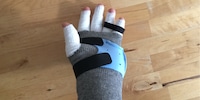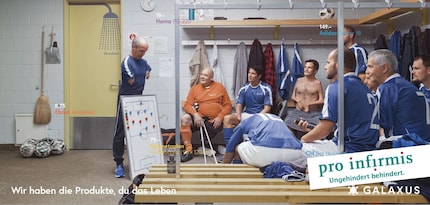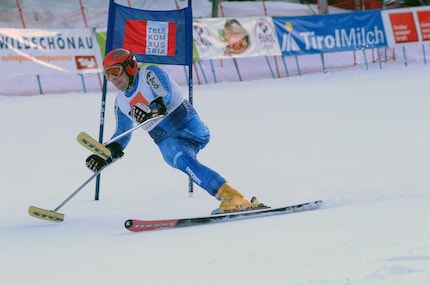
Background information
Piste good. Hand broken.
by Patrick Bardelli

Fritz Berger is 13 years old when his left leg is amputated. Fritz Berger is 13 years old when his left leg is amputated. An accident on his parents' farm changes his life in an instant. Today, the 55-year-old stands in goals for a football team and in front of the camera as a model for Pro Infirmis.
They're all gathered in the dressing room while their coach talks them through the game plan. At first glance, the setting looks like last summer's Galaxus campaign. But only at first glance – at second glance, you'll see that the models in the current Pro Infirmis campaign all have a disability. One of them is Fritz Berger.

In September 1977, the then 13-year-old Fritz was seriously injured on his parents' farm. His left leg had to be amputated.
What happened back then?
Fritz Berger, former Paralympic skier: I was working with a two-wheel tractors with rotary tiller on the field when I lost control and got trapped in the tiller. I suffered serious injuries.
What happened next?
I was taken to the University Hospital of Bern «Inselspital» in Bern. A severe inflammation followed after five days and my left leg had to be amputated. I spent more than six months in hospital and missed half a year of school.
You're 55 today and work as a polymechanic. What are your memories of the time before the accident; your life on two legs?
Honestly, I can hardly remember what it was like to have two legs. I have forgotten how it felt. It's been over 40 years.
What was the biggest challenge in your everyday life?
I had to accept that I couldn’t do all the things I used to anymore and that I could only help a little on my parents’ farm. That was difficult. After my time in the hospital, I went back to school and did an apprenticeship as a polymechanic.
As early as 1981, just four years after the accident, Fritz Berger took part in his first Swiss alpine skiing championships. The first Paralympics followed in 1984. Between then and the end of his career in 2007, he won nine medals for Switzerland at the Paralympics and World Ski Championships. And he has won more than 30 Swiss championships in various disciplines.
You've won a lot of medals at international championships. Which means the most to you?
My greatest success was the title in slalom skiing at the world championship in Lech in 1996.
Why is this title so special to you?
Winning in slalom skiing is difficult – a lot more difficult than in downhill skiing, for instance. You’re not allowed to make any mistakes in two runs and still have to take a lot of risks.
What was the most emotional moment of your career?
After the 1988 Paralympics in Innsbruck, I was invited to the Olympic Winter Games in Calgary for a demonstration competition and finished third. The award ceremony took place in front of 60,000 people. That was my emotional highlight.
I noticed you don't wear a prosthesis when you’re doing sports. Why?
I'm much more flexible without a prosthesis – both in skiing and as a goalkeeper in football.

What role does sport play in your life?
After my accident, I immediately started playing sports again and, among other things, played a lot of football with my friends. I was part of their team just as I was before the amputation. Football was also good training for skiing. And, of course, the success was an acknowledgement of the effort I put into it. I was no longer perceived as a disabled person, but as an athlete. On top of this, I had the chance to meet many people through sports.
I owe a lot to sport.
Which encounters were most memorable?
I met a lot of politicians – member of the Swiss Federal Council, for instance, who were often present at award ceremonies of major events. In 1998 in Nagano, I was allowed to meet the Japanese emperor. But my favourite encounters were with «regular» people who were supportive of what I was doing. The random encounters.
What about other athletes?
I met other athletes at training sessions, on the glaciers in autumn. But I spent most time with other athletes with disabilities.
You mentioned the 1998 Paralympics in Nagano. What was special about Japan?
At the Paralympics in Nagano, we had to get up at four o'clock in the morning on the day of the competition because the trip to the competition sites took two hours. And we didn't get back until late at night.
Which other experiences do you remember?
There are many anecdotes. I remember a story in New York, for example. We had to take a cab from one airport to another. We loaded so many ski bags onto the cab that it made a dent in the roof. I have many stories to tell.
You retired from professional skiing in 2007. Looking back now, is there anything you would do differently?
I would enjoy the special moments even more.
Today, you're the goalkeeper of Plusport Team 2000. What’s the importance of parasports in Switzerland?
I think parasports enjoy good acceptance in society and is still about sports and not about money.
**You're part of the current Pro Infirmis campaign. Why did you take part? **
I like the idea of the campaign, which is to show not only young, beautiful people in advertising, but everything that's part of life. And this also includes people with disabilities. You wouldn’t usually see people with disabilities in adverts.
According to Pro Infirmis, the approximately 1.8 million people with disabilities in Switzerland are still often excluded and fight to me part of society. What are your experiences in this regard?
This is a difficult question and there is no general answer to it. It probably depends a lot on the type and degree of disability. Personally, I've only had a few negative experiences. I guess this also has a lot to do with sports.
**How much longer will you do sports? **
I'll do sports as long as my body allows me to.
Find more stories here. Just follow my author profile.
Images by PluSport Behindertensport Schweiz
From radio journalist to product tester and storyteller, jogger to gravel bike novice and fitness enthusiast with barbells and dumbbells. I'm excited to see where the journey'll take me next.
Interesting facts about products, behind-the-scenes looks at manufacturers and deep-dives on interesting people.
Show all